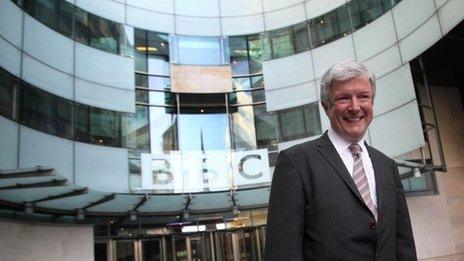BBC rejects subscription fee calls
- Published
- comments

BBC director general Lord Hall will address funding issues in front of MPs in the coming months
The BBC has rejected calls to introduce a voluntary subscription fee for its services.
Responding to a government inquiry, external into the future of the BBC, it argued the £145.50 licence fee was the "most effective way" to fund the corporation.
It warned, external a subscription model - where users only pay for the services they want - would exclude many who could not afford it.
It added the licence fee was funding a public service everyone could use.
The government inquiry comes ahead of the licence fee and royal charter renewals in 2016 and 2017 respectively.
BBC director general Lord Hall and BBC Trust chairman Lord Patten are expected to address the corporation's funding issues in front of MPs for the Commons culture, media and sport committee in the coming months.
Also present will be former Channel 5 chief executive David Elstein, who has said, external introducing a BBC subscription would allow viewers and listeners more choice over which services they pay for.
'Increasing costs'
However in its written submission to the committee, the BBC said introducing alternative funding methods would have "significant drawbacks".
"Subscription would turn the BBC into a commercial operator with an incentive to provide services that maximise revenues and/or profits," it said.
"The evidence suggests a subscription model would be likely to reduce the payment base, increasing costs for consumers who remain and excluding many in society who could not afford to pay."
The corporation also dismissed the suggestion of funding by advertising, saying the quality of its programming would suffer.
"If the objective of the BBC were to maximise advertising revenues, the BBC would shape its programming to maximise the benefits to advertisers rather than to audiences," it said.
It added the current absence of advertising was a "key characteristic [audiences] value about the BBC".
Independence
The BBC also argued against sharing the licence fee with other broadcasters, saying it needed the current level of funding to fulfil its public service remit and future strategy - including the proposed 30-day extension catch-up window on the iPlayer.
It said the fee offered a "stable funding mechanism", allowing it to take risks on programming other commercial rivals could not support, as well as safeguarding its independence.
There have been calls previously from some politicians and industry figures for the licence fee - worth some £3.7bn a year - to be split amongst other broadcasters for public service content.
However Channel 4 chief executive David Abraham told the Financial Times, external he would rather protect his channel's freedom and act "with utter impunity because we are not looking over our shoulders", than receive the money.
Current research shows 96% of UK adults use one or more of the BBC's services each week, costing 40p per household, per day.
According to a Ipsos Mori poll conducted for the BBC in November, 47% of adults said they were happy with the licence fee as the BBC's main source of funding, with 27% preferring advertising, 22% choosing a subscription-only service and the rest undecided.
A similar poll conducted in 2004 found 31% in favour of the licence fee, 31% for advertising and 36% a subscription service.
- Published11 December 2013
- Published27 November 2013
- Published27 October 2013
- Published20 October 2010